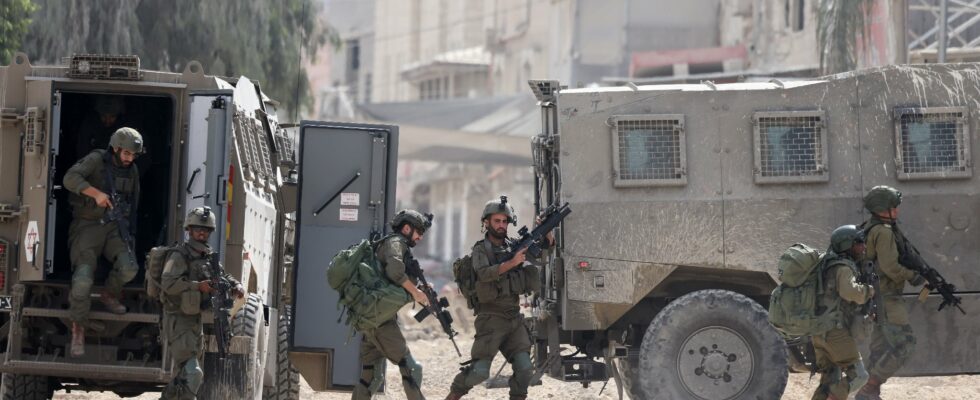Since the night of August 27-28, Israel has been conducting a military operation in the occupied West Bank. Although it is not experiencing the same intensity of war on its soil as in Gaza, this Palestinian territory – nibbled away at since the 1980s by Israeli settlers – remains a major area of tension. Described as “anti-terrorist” by the Hebrew state, the operation led by Israel has so far claimed the lives of twelve people, according to AFP. Since the terrorist attacks of October 7 and the launch of the Israeli offensive in the Gaza Strip, 637 people have died in the West Bank, the highest total over an eight-month period, according to the United Nations.
Where does the operation take place?
Occupied since the Six-Day War of 1967, the West Bank is supposed – according to the Oslo Accords, signed in 1993 – to have territories (areas A and B) under the full administration of the Palestinian Authority. However, it is in these areas supposedly under the control of the Palestinian Authority that Israel is conducting its operation. “These incursions are daily [mais c’est plus] “It is rare that they are carried out simultaneously in several cities,” reports AFP. The Israeli operations focused on three localities – all located in the north of the territory – and their refugee camps: Jenin, Tulkarem and Toubas. The location is known to shelter “armed groups fighting against Israel”, they “are particularly active there”, comments AFP.
What happened?
The Israeli army, on the night of 27-28 August, entered the Palestinian refugee camps of Nour Shams, near Tulkarem and Al-Fara, near Tubas, as well as the city of Jenin, using columns of armoured vehicles. On the ground, the Palestinian camp reported significant violence. “The medical teams have been hindered since the beginning of the assault, and the entrances to the Nour Shams camp and the hospitals in the governorate have been closed to hinder the work of the medical teams,” said Ahmed Zahran, a paramedic with the Palestinian Red Crescent.
“The destruction is enormous. [Les soldats israéliens] attacked infrastructure in the Nour Chams camp [détruisant] “The water and sewer network,” reported Hakim Abu Safiyeh. He works as a municipal employee in Tulkarem. For its part, the Israeli army assured that operations to “neutralize bombs [dissimulées] on the side of the road” had caused “unintentional” damage to the water network.
On the evening of the first day of operations, Israel claimed the death of “nine armed terrorists”, seven of them following “air raids”. For its part, Islamic Jihad – an Islamist movement allied with Hamas – acknowledged the loss of “three of their soldiers” in the attack led by Israel. On the second day of operations, August 29, Tsahal was still operating in the Nour Chams camp and the city of Jenin. In the first, the Israeli army announced the death of “five terrorists” holed up in a mosque in Nour Chams. For its part, Islamic Jihad acknowledged the loss of the head of the branch occupying the camp. This is “Abu Choujaa”, accused of being behind a shooting – last June – which took the life of a sixty-year-old Israeli. Finally, Tsahal announced the death of two “terrorists” in the city of Jenin.
What reactions?
The UN quickly expressed concern about the Israeli incursion. It warned of the risk of “worsening an already catastrophic situation”. The international organization also deplores the presence of children among the victims of the military operation. Its general secretariat criticized the “deadly war tactics that appear to exceed international standards for maintaining order”.
In this context, Washington announced new sanctions against “extremist” settlers on Wednesday. Benjamin Netanyahu, head of the Israeli government, considered this “imposition of sanctions against Israeli citizens” to be “very serious”. For Israel and its Minister of Foreign Affairs, Israel Katz, the army intends to “dismantle the Iranian-Islamist terrorist infrastructure” in the West Bank. On the social network X, he called for action there “with the same determination […] than in Gaza, with temporary evacuations of Palestinians.”
For its part, Islamic Jihad considers that through its operation, Israel is working “toward the annexation of the West Bank.” As for Hamas, one of its leaders – Ezzat Rishq – saw it as a call to “expand the spiral of destruction and genocide.” Governor of Tulkarem, Mostafa Taqataqa said he saw in these raids “a dangerous and unprecedented signal [qui] seems to indicate that this operation will last.”
